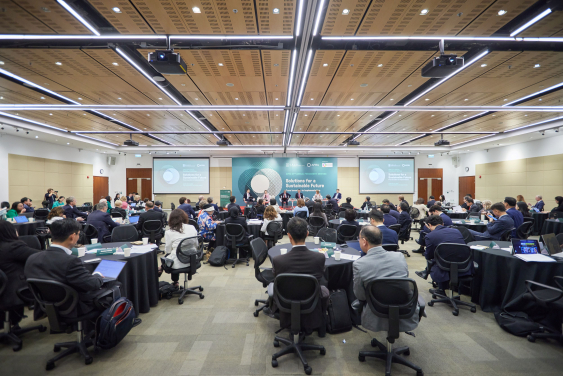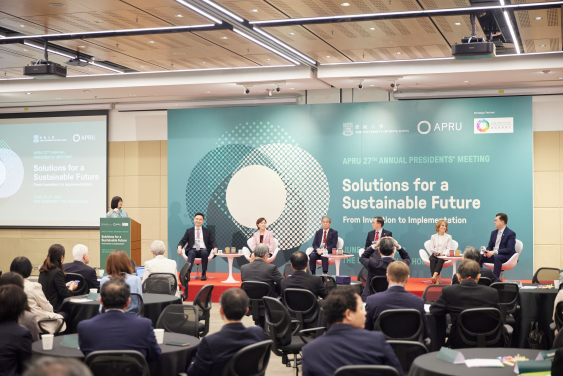Media
University leaders take up the cause of fostering a sustainable world
28 Jun 2023
From global warming, climate injustice, deforestation, expanding migration to aging society, university presidents from the Asia Pacific region have raised concerns about pressing issues affecting the human society and are gearing up efforts to find solutions.
At panel discussions held on the last day of the 27th Annual Presidents’ Meeting of the Association of Pacific Rim Universities (APRU) hosted by the University of Hong Kong during June 25-27, the academic leaders echoed the unique position higher education institutions have in addressing global challenges.
They highlighted efforts undertaken on campuses and beyond to nurture innovative mindsets, as well as skills, empathy, sense of responsibility, even a sense of purpose among students to build a sustainable world for the future, in line with the Sustainable Development Goals advocated by the United Nations.
Singapore’ s Nanyang Technological University has set the goal for a 50% reduction in both energy consumption and waste by 2025, much more ambitious than the national target. “Besides investing in better technology to make the world a better place, we actually figure out ways to use less energy through our research agenda,” said NTU President HO Teck-Hua.
Describing his campus as a living lab for sustainability, Bundhit Eua-Arporn, President of Chulalongkorn University, Thailand, emphasized the importance of both students’ involvement and collaborations with communities and corporations. “Universities have to be flexible and allow students to choose what they want to learn, and expose them to reality,” he said during discussion at the Presidents’ Meeting with the theme of “From Invention to Implementation: Solutions for a Sustainable Future”.
Sustainability and the arts are a major initiative at the University of Southern California, according to President Carol L. Folt. “Many students may not talk about their passion in their Tech class but when they're producing art, that is an expression of their care about sustainability and develops a whole language of conversation that is very different.”
Institutions have launched interdisciplinary undergraduate and graduate programmes to enhance students’ awareness and prepare them for future leadership positions. Nagoya University, for example, runs a host of programmes exposing students to diverse concepts. “Our Education for Sustainable Development Programme is a joint programme involving six graduate schools covering environmental studies, international development, humanities, economics etc., ” said President Naoshi Sugiyama.
Similarly, while aiming to achieve 50% carbon neutrality by 2028, the National Taiwan University also attaches importance to interdisciplinary training, according to President Wen-Chang Chen. “We have more than 700 research projects and courses aimed at developing technology and sustainability.”
Another panelist, President of the Hong Kong University of Science and Technology, Professor Nancy Y. Ip acknowledged the need for changes in curriculum and educational approaches. Service learning and project-based learning are effective ways to prepare students for the challenging tasks ahead. “I do believe higher education is a very important catalyst in order to make progress towards a more resilient education that is firmly grounded not only in excellence but also equity, inclusion and diversity.” She added: “If we can combine innovation and humanity, we will be able to find solutions beneficial to the society.”
On the topic of global risks, university chiefs voiced out against the injustice inflicted on developing countries by heavy energy consumption in the developed world. Countries that have contributed to the bulk of carbon emissions on earth have the greatest responsibility to help those countries that, while not having been large emitters, will suffer first and worst from the climate emergency.
Professor Andrea Encalada, Provost, Universidad San Francisco de Quito, warned of the devastating consequence of deforestation in the Amazon rainforest. “We are reaching a tipping point now,” she said. “If we have more than 25% of deforestation on the southern part, the rainforest will become a savannah.”
She added: “People don't know that most of Africa and south America do not have waste water treatment plants; while we as a university make efforts in operating our own waste treatment plant, the water treated by us is sent into river that is completely polluted.”
Other academic leaders shared her view that higher educational institutions should spread the word among students and the international community about the grave harm being done to the earth. Global actions are needed to tackle fundamental threats to human life, noted the President of the University of the Philippines, Angelo A. Jimenez. “Climate justice is our greatest moral imperative. Universities should play the role of a global moral force.”
And that involves much more than teaching and research, or drives such as a ban on plastic straws, or green buildings. The academics called for plans or programmes to combat the threats of rising sea levels, biodiversity loss and global warming, etc.
Vice-Chancellor and President of the University of Sydney, Professor Mark Scott, said: “It is important to equip faculty with skills to be articulate, to showcase their expertise, explain their research to the public with authority and be resilient in the face of attacks in leading public discourses.”
Public education will always be important, in addition to the room for more innovative programmes. “Absolutely we have obligations to be thinking about how we will continue to educate,” said Joy Johnson, President of Simon Fraser University, which sources food locally and works with local farmers to “ensure that they think about food production in a new, sustainable way.”
Her university has also lent support to the global Scholars at Risk programme to help people displaced by the effects of climate change, or climate refugees, estimated to be in excess of 30 million by 2050 by the United Nations.
Bound by a shared commitment to tackle global threats, the member universities of APRU have expressed appreciation for the network as a valuable platform for information sharing and collaborations. “We really need to collaborate more so I think that this network is very powerful,” said Professor Andrea Encalada.
For Media enquiries, please contact:
HKU Communications and Public Affairs Office
Ms Melanie Wan (Email: melwkwan@hku.hk)
Ms Jaymee Ng (Email: ngjaymee@hku.hk)
Mr Kenneth Choi (Email: khkchoi@hku.hk)


